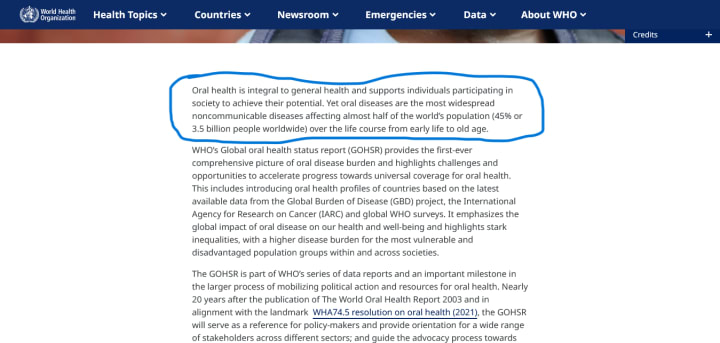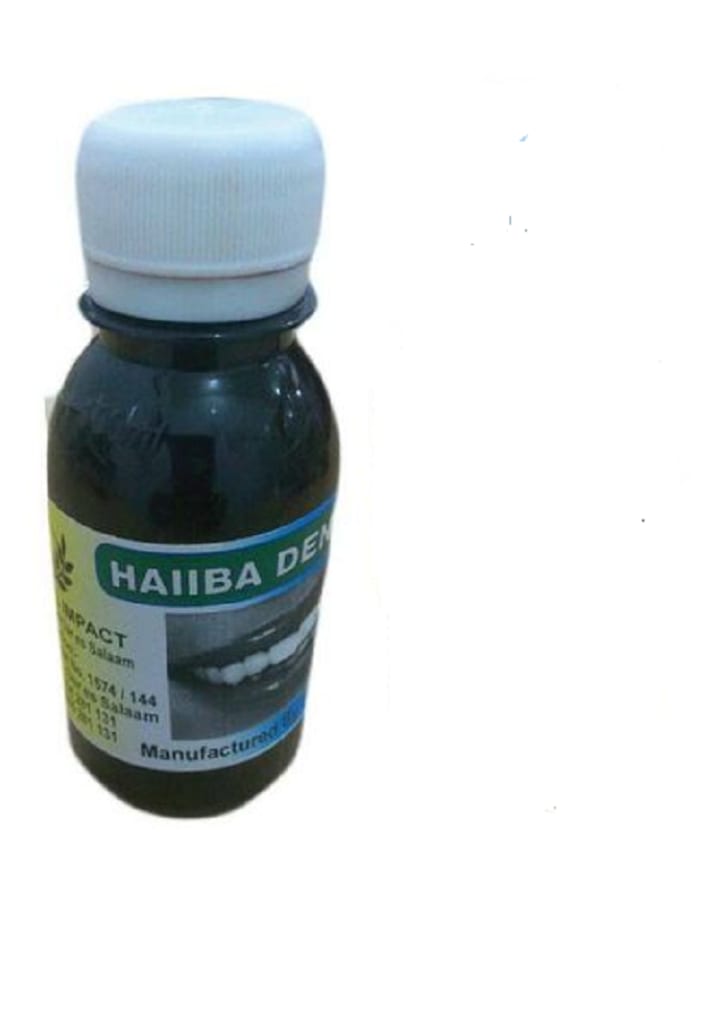How I Have Avoided a Toothache for 20 Years!
Sometimes the Cheapest Processes are Also the Most Valuable

For more than 20 years, I have not experienced any oral diseases. It never used to be like that. Before that, I had a few teeth extractions, at least one root canal, and two amalgam fillings!
The last tooth trouble I had was in 1998 when I had a root canal. At the time, I didn't know that root canals were associated with adverse health effects, so when the young doctor advised me to undergo it, I agreed.
I must admit that after the operation, it felt wonderful. All the pain was gone, and my tooth was still there! Later on, as I became interested in health and wellness topics and did some reading, I became aware that root canals were linked to certain adverse health effects. So, how did I avoid oral problems for so long?
Given the oral health profile around the world, staying without oral health issues for such a long time is remarkable. According to the World Health Organization (WHO), oral health issues are so prevalent that they surpass all other non-communicable health issues. WHO estimates that close to 50% of the global population experiences oral health issues. The trick I learned to eliminate oral health issues on my part is closely linked to my change of occupation, and I would like to reveal it within this context.

In 2004, I was forced to leave full-time employment. I wasn't fired or anything like that. In fact, the managing director of the company was hell-bent on retaining me, but I stuck to my guns. I wanted to quit no matter what, and nobody could make me stay.
But why did I want to quit so much?
There were two reasons why I decided to quit. The first reason was related to a visit we received from job evaluators sent by the company headquarters in South Africa about a year before I wrote my letter requesting to be considered for redundancy. By the way, I lived and worked in Tanzania. My employer was British Petroleum Tanzania Limited, one of the British company’s many associates across the world. If you don’t know your world geography, Tanzania is in East Africa.
Every employee met privately with the team of job evaluators who asked a lot of questions, and we answered them. After the session, they gave a recommendation for each employee. In my case, they told me to ask my superiors to give me a different job. Why? I had a master’s degree, and yet the job I held at that time didn't allow for promotion. As a laboratory manager, there was no room for further advancement.
What made it worse was that without a promotion, there couldn't be any significant leaps in salary and benefits. I had to wait for the meager end-of-year salary increase, which was not even guaranteed. Salary increases were given only when the company's Board of Directors was pleased with the overall performance.
When I asked my bosses for a job transfer, they ignored me. The seed of frustration was formally planted. The second reason for wanting to quit emerged a few months after the visit from the job evaluators. This time, it was due to company restructuring. Out of the blue, it was announced that the company needed to undergo restructuring. Old job positions were eliminated, and new positions were posted. Approximately 50% of the staff faced the axe.
To make the process appear fair, we were told that the posted positions were open to everyone. If you were initially a driver, for example, but now wanted the managing director's position, you could go for it!
We applied, and as expected, almost 50% of the workforce became redundant. I was one of them, and psychologically, I started preparing to leave. The problem was that the HR department never called me for my redundancy letter. I came to work every morning, worked hard, and yet I was nowhere to be found on the company's organizational chart!
I became so frustrated; I don't know how to describe it. Just imagine not knowing whether you have employment or not! I couldn't even share this experience with my family. I didn't want them to worry.
After three months of living like this, I lost my cool. I was so angry that I didn't care about protocol anymore. I remember waking up one morning and writing a thirteen-page email to my managing director, in which I poured out all the accumulated frustration!
The man was very courteous. He responded almost immediately and asked me to see him at his office without delay. When I got there, the HR manager was also present. They apologized for putting me in the harrowing situation I have just described and assured me that 'of course, I was a valuable part of the team.' To show their sincerity, they handed me an apology letter that also stated I had been given a 10% pay rise!
I was satisfied for a day or so, and then I remembered that I had reached the top of my career ladder at British Petroleum Tanzania Limited, and a job change was not expected since my superiors didn't even show the inclination to discuss the matter with me when I approached them. This memory came accompanied by deep dissatisfaction.
The dissatisfaction drove me to write a letter requesting redundancy. They tried to hold on to me, but I was adamant about my decision. After three months of haggling, they agreed to let me go.
After leaving my job, I asked myself what I wanted to do. I didn’t want to be a full-time employee again as I feared a repeat of my earlier experience. I decided to take some free business courses and become a freelance business consultant. Alongside that, I took on some jobs writing business plans and project proposals, although they were infrequent. Sometimes, three months or even more went by with no projects. After a couple of years of uncertainty, I realized that I should also leverage my university education.
In 2007, armed with a master's degree in organic natural products research chemistry, I started a one-man firm called Herbal Impact. Its main focus was on researching and creating formulations for medicinal natural products. This journey has not been easy. I had limited funds and couldn't obtain a loan or attract an investor. However, we have managed to survive, and I have found great satisfaction in pursuing my dreams.
Now, let me share the big secret.
During my research to find a mouthwash capable of swiftly eradicating oral infections, one of my friends jokingly said, 'Are you fond of wasting your time? When people realize that this simple trick is all they need to do away with oral health issues, who is going to buy your product?'
'What simple trick?' I asked, somewhat puzzled.
'You know the Maasai?' he asked.
I nodded my head but didn’t speak.
'The primary diet of the Maasai is meat. Because of this, they need strong teeth. They ensure their teeth are clean all the time by brushing them almost continuously!' he explained.

Before I could respond, he added, 'People need to brush their teeth after a meal, especially after dinner. If you don’t brush your teeth thoroughly before going to bed, you give gram-positive bacteria, attracted by food remains in your mouth, a whole night to wreak havoc while you are sleeping. A change of mindset is required. Protective tooth brushing is done at night before going to bed, and not after waking up in the morning!'
I was left speechless, but in my consciousness, I decided to test the advice. Well, it works! I believe 100% that this is the reason why I have not experienced any oral problems for over 20 years.
This realization did not stop me from continuing my research to develop the mouthwash I mentioned earlier. After many attempts, I created one and called it Haiiba Dental Guard. Let me just say that this product is miraculous. It kills millions of bacteria instantly upon contact. Many people who thought the only solution to their toothache was extraction or a root canal procedure have been completely cured by this product within 15 minutes of use.

So far, we have managed to invent many valuable formulations that can help people worldwide. These formulations have shown remarkable success in treating various diseases, including:
1. Coronary arterial disease
2. Hypertension
3. Stroke
4. Neurological disorders, including tinnitus and vertigo
5. Asthma
6. Liver disorders
7. Urinary incontinence
8. Hemorrhoids
9. Various cysts, including ovarian and kidney cysts
10. Fibroids
11. Prostate enlargement
12. Infertility
13. kidney disease
14. Backache
15. Stomach ulcers
16. Urinary tract infections (UTI)
17. Knee and joint pain
18. Vaginal candida infection
19. Athlete's foot and other skin fungus
20. irritable bowel syndrome
21. Viral infections, including HIV and Hepatitis
This journey has taught me a valuable lesson. Although it is commonly believed that inventing a product or service that many people need is the key to financial success, I have discovered that it is not that simple.
Getting your product into the market and having it accepted matters more. Building the bridge between your product/service and the market is an expensive undertaking. If you don't have enough budget for this, it is likely that the product or service will struggle.
Our products are struggling, despite their immense problem-solving potential worth billions of dollars. I’m not exaggerating when I say that these products have problem solving potential worth billions. Take for example, our product known as Haiiba C and C Support Plus. This product can effectively treat cardiovascular diseases (CVDs) within 12 weeks of use. Our clinic has used it effectively to heal many people who were initially earmarked for heart operations or were put on life time use of high blood pressure drugs.

Now just imagine. CVDs are the leading causes of death worldwide. According to the World Health Organization (WHO) an estimated 17.9 million people died from CVDs in 2019, representing 32% of all global deaths. Of these deaths, 85% were due to heart attack and stroke. Over three quarters of CVD deaths take place in low- and middle-income countries. Why is this? Most likely because access to health services in these countries is low and also the cost of treatment is prohibitive. Take for example my country Tanzania. While the minimum wage is Tanzania shillings 300,000.00 (US$ 105.30 at current exchange rate), the cost of an operation to place a stent in the heart of a patient with blocked heart blood vessels costs Tanzania shillings 10,000,000.00 equivalent to US$ 3,508.80. It is obvious that a Tanzanian earning a minimum wage will never be able to afford the operation. Repeat this scenario across other low-income countries and you have your reason CVDs deaths are high and why they mostly occur in low-income countries.
This is happening despite the fact that Haiiba C and P Support is available and its current cost is relatively very low. A total 12-week dose of Haiiba C and P Support Plus costs only Tanzania shillings 480,000.00 which is equivalent to US $ 168.40! So, what is the problem? The problem as I have said before is bridging with the market. Since we don’t have the cash to finance our marketing efforts this situation will continue to perpetuate itself.
Let me end the story here. For a writer the end of one story is the beginning of other stories. So, let us hope that this story is accepted and published so that this writer can continue sharing his experiences with you. Thanks very much. If you liked it, you can subscribe to get my stories directly through your email. Additionally, I operate a health and wellness blog that needs to build an audience. Please support me by visiting the blog and leaving your comments. https://health-wellness-spring.blogspot.com/?zx=425344f7e43c3b38- WELLNESS - SPRING. Thank you very much for your support."
About the Creator
Juma Killaghai
Juma Killaghai is a research chemist with over 30 years of experience in the field of research and development. He has a Master’s degree - Organic chemistry, from the University of Dar es Salaam. He resides in Dar es Salaam, Tanzania






Comments (1)
Super guidance.